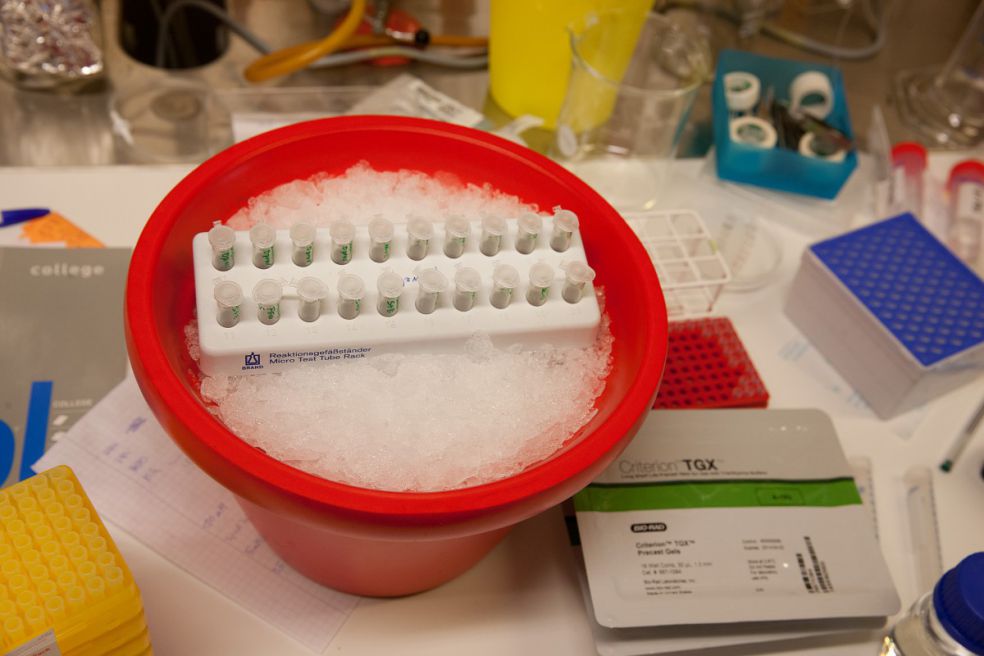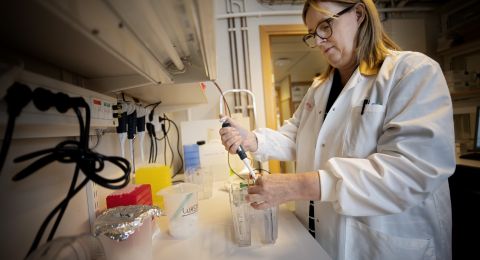
Project Grant 2012
Prevention of beta-cell failure in type 2 diabetes
Principal investigator:
Helena Edlund
Co-investigator:
Thomas Edlund
Institution:
Umeå University
Grant:
SEK 29.4 million over five years
With the help of project funding from the Knut and Alice Wallenberg Foundation, Helena Edlund, Professor of Molecular Embryology at Umeå University, and her colleagues will be conducting in-depth research on the connection between the body’s cleaning system and insulin-producing beta cells in the pancreas. They also want to find out why and how autophagy is affected by obesity and age.
“A specific enzyme – AMP-activated protein kinase (AMPK) – stimulates the cleaning process in all cells. In this project we will be activating the enzyme chemically and genetically to see whether cleaner beta cells work better and survive longer,” says Edlund.
It is already known that obesity and bodily ageing cause autophagy to decline, and that this is linked to neurodegenerative diseases such as Alzheimer’s, ALS and Parkinson’s. A typical feature of neurodegenerative diseases is the aggregation of harmful amyloids, i.e. protein clumps.
Harmful high levels of insulin
Edlund believes that high levels of insulin also impair autophagy and cause amyloid proteins to accumulate.
“There has been a tendency to overlook the link between amyloid aggregation and type 2 diabetes. Elderly people and those who are overweight often develop insulin resistance. In itself, this is not a problem as long as there are functioning beta cells. But when too many beta cells are stressed, amyloid accumulates, impairing beta cell function, and ultimately their survival. This causes type 2 diabetes to develop. It’s as if the cleaning system can no longer carry out its job of clearing the protein clumps.”
One reason the part played by the formation of amyloids in the development of type 2 diabetes has not attracted much attention is that most experiments are carried out on rodents. Toxic protein aggregations are not formed in the beta cells of rodents.
“This is why we’re using a genetically modified “humanized” mouse that expresses the human protein that forms amyloid. The aim is to understand the role played by autophagy in preventing amyloidal protein aggregations, which are eventually fatal.”
Edlund believes it is possible to recreate the function of beta cells.
“I think it’s possible to ‘rewind’ and inhibit amyloid aggregation in the beta cell as long as cell function is not too badly impaired.”
Potential drug
Betagenon, a company that Edlund runs together with her husband Professor Thomas Edlund, is working on a drug with the potential to stimulate autophagy and inhibit amyloid formation.
“We have used the drug experimentally on overweight mice, and found that they do not become prediabetic. In this project we are also studying islets of Langerhans from diabetics and non-diabetics to compare autophagy in the two groups. Results so far suggest that autophagy is impaired in diabetics. Now we want to understand cause and effect,” Edlund explains.
The islets of Langerhans are largely made up of insulin-producing beta cells.
“We hope that the Betagenon drug candidate, which activates the AMPK enzyme, and hence autophagy, will inhibit amyloid formation, and thereby also impaired beta cell function and the onset of type 2 diabetes.”
Fasting and exercise
Another way of keeping insulin levels in check and preventing the onset of type 2 diabetes is something we all know about, and can do – cutting our calorie intake and exercising more.
“A study was made in 2011 of a number of people who were obese. For one week they could consume only 600 calories a day. Their glucose and insulin levels sank to normal. Anything that enables us to maintain even, normal insulin levels that do not impair autophagy is good,” Edlund points out.
This also supports the theory that fasting from to time can be a good thing.
“There are long traditions of fasting in all cultures. Fasting gives cells time to clear out detritus with the help of autophagy.”
She hopes that health centers will in future be able to measure insulin levels, rather than blood sugar, from a drop of blood.
Elevated insulin levels inhibit not only autophagy; they also cause fatty liver disease, and resulting insulin resistance in the liver, which in turn causes the liver to start pumping out sugar. High insulin levels can also impact the development of cancer.
“Increasing numbers of children and young people are suffering from fatty liver disease because they consume too many sugary drinks. Fortunately, fatty liver disease itself is treatable, but it may also lead to chronic diabetes and cirrhosis of the liver. The trend is disastrous – the best and most effective remedy is to change diet and start exercising,” says Edlund.
Text Carina Dahlberg
Translation Maxwell Arding
Photo Magnus Bergström





